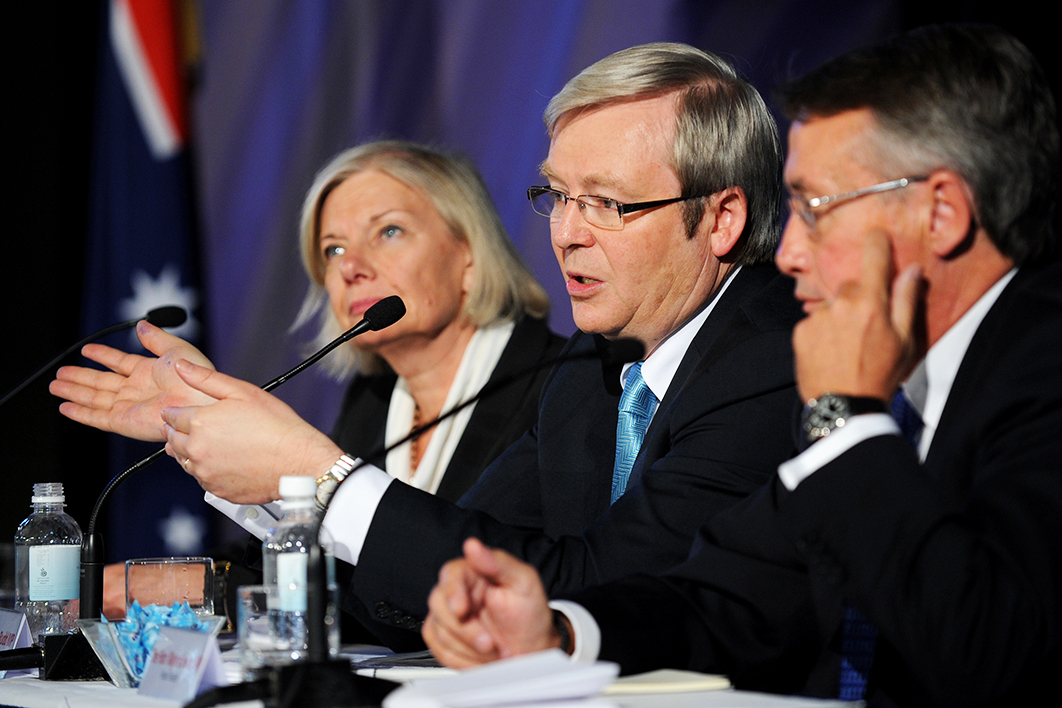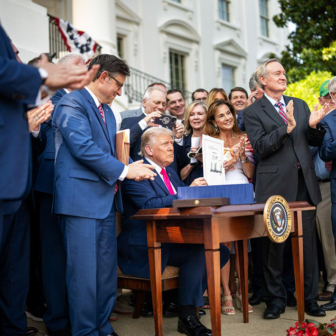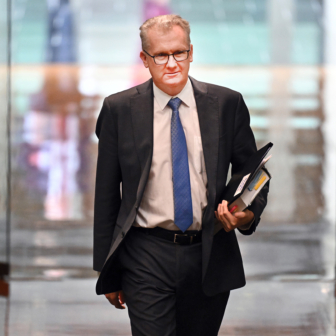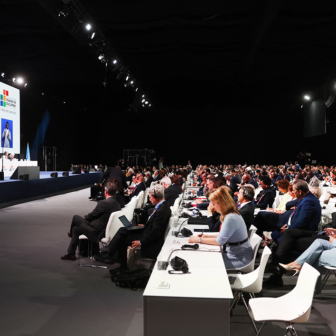It’s eleven years since Kevin Rudd’s Labor government announced its spending splash to alleviate the impact of the global financial crisis. The money helped Australia avoid a recession but also created a monumental political rod for the Labor Party’s back. It still struggles with it today.
Way back then I wrote about the opposition’s decision to oppose the second phase of the stimulus. (The Coalition had supported Rudd’s Christmas cheques in the mail.) Prescient in parts, the article suggested that the decision would pay off for the Coalition in the long run, although its leader, Malcolm Turnbull, might not be around to reap the rewards. But while I anticipated Labor would be hamstrung by a weak economy, I didn’t grasp the extent to which the pay-off for the government’s opponents would take the form of the powerful “debt and deficits” narrative that so completely buried the Rudd and Gillard governments.
It’s a seductively simple story: the Howard government bequeathed a healthy fiscal situation; Labor trashed it. That’s how most Australians still see it today. In reality, the GFC turned surpluses into deficits, or deficits into larger deficits, all over the world. Yet Australia’s Labor government suffered immense political damage compared, say, with New Zealand’s National Party, which won government in November 2008, oversaw a similar fiscal deterioration, but thrived politically.
A fair chunk of the Australian population, apparently including our political class, continues to believe that that stimulus “wrecked” future budget outcomes. But stimuluses don’t do that; they add to debt but only affect the budget in the year they are enacted (and add a little bit in interest repayments in subsequent years). If the Rudd government had sat on its hands, the budget would still have gone into deficit (if not in 2008–09, then certainly from 2009–10) — the GFC-induced collapse in revenue alone would have ensured that — but the politics might have played out differently. Even if we’d gone into recession the government might have been cut more slack. As it was, Australia avoided a recession in part because the government spent big, and spent ostentatiously — a fact that has been used ruthlessly against Labor to this day.
Like centre-left parties around the world, Labor has long had a problem with perceptions of economic management, and particularly spending. The comparative records of Labor and Coalition governments don’t confirm these stereotypes, but it’s fair to say the average Labor supporter and the average backbencher are much more disposed to letting loose the purse strings than their conservative counterparts, and help maintain those perceptions, which played a part in last year’s election result.
Now, with money needing to be spent, and fast, the Morrison government’s ballyhooed surplus chickens look like they’re coming home to roost. But it’s still Labor, burdened by history, that needs to take most care. So how should the opposition respond to the government’s stimulus package?
Shadow health minister Chris Bowen has foreshadowed that the opposition will wave through “sensible measures” while urging a Newstart increase and financial assistance for casual workers forced to take time off work. Shadow treasurer Jim Chalmers has insisted the stimulus must proceed quickly. Labor can certainly criticise the nature and speed of the package, but it shouldn’t argue for a bigger splash: that would play into preconceptions about the party. You can just hear the prime minister and treasurer in parliament: “Borrow and spend another $10 billion that we don’t have — why didn’t we think of that, Mr Speaker? Why not $20 billion, $30 billion?! Labor still hasn’t learned the lessons…”
The Morrison government is talking about injecting less than $10 billion. Pensioners, Newstart recipients and small businesses are apparently “being considered for one-off payments.” But there’ll be no permanent Newstart increase — despite the fact it’s supported by many, including former prime minister John Howard — because that would affect future budgets. And you can bet the government will be thinking about the fiscal year after this one, 2020–21, the final figures for which, published in September next year, will be the last such numbers before the 2022 election.
Having blown this year’s surplus, the government will be eager to bring in a good one next time. It could do what the Abbott government did to the 2013–14 financial year (ten months of which came after they’d taken office, though that didn’t stop the Coalition calling it “Labor’s final budget”): bloat the deficit grotesquely by pulling forward expenditure and pushing back receipts. (That year it even gave the Reserve Bank $9 billion on the proviso it handed the money back in the following years — how good was that?) Then reap the benefits — less spending, more income — in the following year.
Ministers could justify that kind of rearrangement on stimulus grounds. Then they could cross their fingers and hope for the best, and if the anticipated recession is short, 2020–21 might even be in surplus.
Now that would be something to boast about at the 2022 election. •





